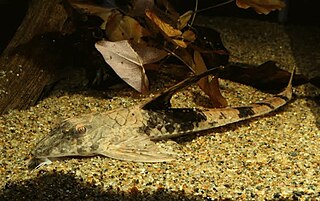
Catfish are a diverse group of ray-finned fish. Named for their prominent barbels, which resemble a cat's whiskers, catfish range in size and behavior from the three largest species alive, the Mekong giant catfish from Southeast Asia, the wels catfish of Eurasia, and the piraíba of South America, to detritivores, and even to a tiny parasitic species commonly called the candiru, Vandellia cirrhosa. Neither the armour-plated types nor the naked types have scales. Despite their name, not all catfish have prominent barbels or "whiskers". Members of the Siluriformes order are defined by features of the skull and swimbladder. Catfish are of considerable commercial importance; many of the larger species are farmed or fished for food. Many of the smaller species, particularly the genus Corydoras, are important in the aquarium hobby. Many catfish are nocturnal, but others are crepuscular or diurnal.

The flathead catfish, also called by several common names including mudcat or shovelhead cat, is a large species of North American freshwater catfish in the family Ictaluridae. It is the only species of the genus Pylodictis. Ranging from the lower Great Lakes region to northern Mexico, it has been widely introduced and is an invasive species in some areas. The closest living relative of the flathead catfish is the much smaller widemouth blindcat, Satan eurystomus, a cavefish.

Podilymbus is a genus of birds in the Grebe family, the genus name is derived from Latin Podilymbus, a contraction of podicipes —the origin of the name of the grebe order—and Ancient Greek kolymbos, "diver".

Loricariidae is the largest family of catfish, with over 90 genera and just over 680 species. Loricariids originate from freshwater habitats of Costa Rica, Panama, and tropical and subtropical South America. These fish are noted for the bony plates covering their bodies and their suckermouths. Several genera are sold as "plecos", notably the suckermouth catfish, Hypostomus plecostomus, and are popular as aquarium fish.

The channel catfish, known informally as the "channel cat", is North America's most abundant catfish species. It is the official fish of Kansas, Missouri, Nebraska and Tennessee. The channel catfish is the most fished species of catfish in the United States, with around 8 million anglers angeling them per year. The popularity of channel catfish for food has contributed to the rapid expansion of this species' aquaculture in the United States. It has also been widely introduced to Europe, Asia and South America, and many countries consider it an invasive species.

Basa is a species of catfish in the family Pangasiidae. Basa are native to the Mekong and Chao Phraya basins in Mainland Southeast Asia. These fish are important as a food source, and also on the international market. They are often labelled in North America and Australia as "basa fish", "swai", or "bocourti". In the UK all species of Pangasius may legally be described as "river cobbler", "cobbler", "basa", "pangasius", "panga", or any of these with the addition of "catfish". In the rest of Europe, these fish are commonly marketed as "pangasius" or "panga". In Asian markets, names for basa include "Pacific dory" and "patin". Other related shark catfish may occasionally be incorrectly labeled as basa fish, including P. hypophthalmus and P. pangasius.

The Ariidae or ariid catfish are a family of catfish that mainly live in marine waters with many freshwater and brackish water species. They are found worldwide in tropical to warm temperate zones. The family includes about 143 species.

Oreoglanis is a genus of fish in the family Sisoridae native to Asia. These fish live in fast-flowing streams in China, mainland Southeast Asia and the Indian subcontinent. They are mainly distributed in the Mekong, upper Salween and Irrawaddy River drainages. They range from the Brahmaputra basin to the Lam River drainage in central Vietnam. They are easily distinguished from other catfishes by their strongly depressed head and body and greatly enlarged paired fins that have been modified to form an adhesive apparatus. The flattened shape of these fish and the large pectoral and pelvic fins provide essential adhesion in the fast-flowing waters they live in.

Bagrichthys is a genus of bagrid catfishes.
The cape blue-eye is a species of fish in the subfamily Pseudomugilinae. It is endemic to Papua New Guinea. This species reaches a length of 5.0 cm (2.0 in).
The black lancer is a species of bagrid catfish found in Vietnam, Cambodia, Indonesia, Laos, Malaysia and Thailand. It grows to a length of 25.0 cm.

Hadrianus is an extinct genus of tortoise belonging to the Testudinidae found in the United States, the Yolomécatl Formation of Mexico, the Alai Beds of Kyrgyzstan and Spain and believed to be the oldest true tortoise known. The genus is thought to be closely related to the genus Manouria. The genus may have evolved in the subtropics of Asia and subsequently migrated to North America and Europe. Evangelos Vlachos (2018) reassessed the North American species attributed to the genus, and determined only two as accepted namely H. corsoni & H. majusculus. The remaining species were identified as either junior synonyms, moved to other genera or considered nomen dubium do to incomplete fossils.
Bagrichthys macropterus, the false black lancer, is a species of bagrid catfish found in Cambodia, China, Indonesia, Laos, Malaysia, Thailand and Vietnam. It grows to a length of 30.0 cm and is commercially fished for human consumption.
Bagrichthys micranodus is a species of bagrid catfish endemic to Indonesia where it is found in western Borneo. It grows to a length of 18.5 cm.

Bagrichthys obscurus is a species of bagrid catfish which is found in Cambodia, Laos, Thailand and Vietnam where it is found in the Chao Phraya, Bang Pakong and Mekong drainages. It grows to a length of 24.9 cm.
Bagrichthys vaillantii is one of species of bagrid catfish in the genus Bagrichthys. This fish is endemic to Indonesia where it is found in the Mahakam River basin in eastern Borneo.

Catfish: The TV Show is an American reality-based documentary television series airing on MTV about the truths and lies of online dating. The series, which premiered on November 12, 2012, is based on the 2010 film Catfish.

Catfish and the Bottlemen are a British indie rock band formed in Llandudno, Conwy, Wales, in 2007. Their debut album, The Balcony, was released in 2014, peaking at number ten on the UK Albums Chart and later achieving Platinum certification on 30 December 2016. Renowned for their energetic live performances, the band have toured across North America, South America, Europe, Japan and Australia, performing at festivals including Glastonbury, Reading and Leeds, Latitude, TRNSMT, T in the Park, All Points East, Governors Ball, Bonnaroo, Lollapalooza, Falls Festival and Splendour in the Grass.

Catfishing refers to the creation of a fictitious online persona, or fake identity, with the intent of deception, usually to mislead a victim into an online romantic relationship or to commit financial fraud. Perpetrators, usually referred to as catfish, generally use fake photos and lie about their personal lives to present themselves as more attractive for financial gain, personal satisfaction, evasion of legal consequences, or to troll. Public awareness surrounding catfishing has increased in recent years, partially attributed an increase in the occurrence of the practice combined with a number of high-profile instances.
Podilymbus majusculus is an extinct species of grebe recovered from the Piacenzian age of the United States.














